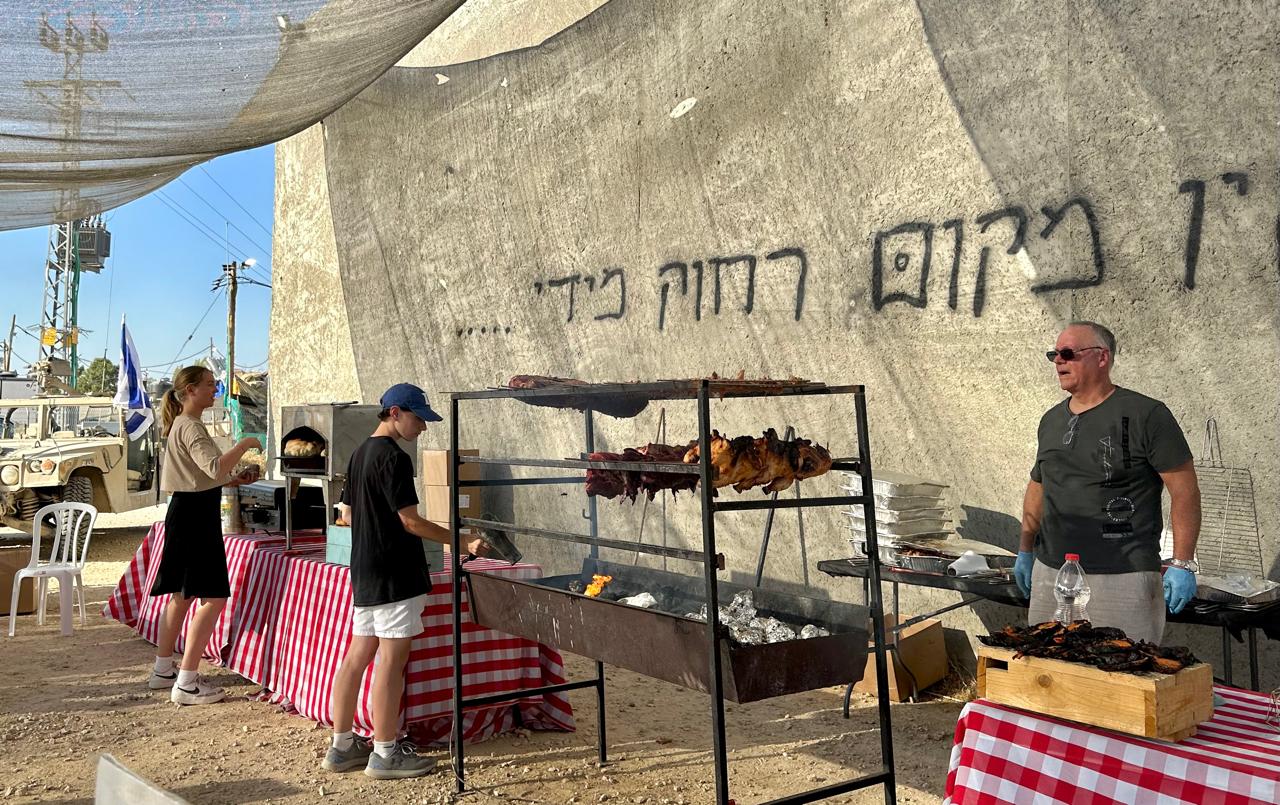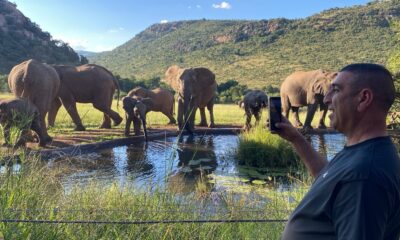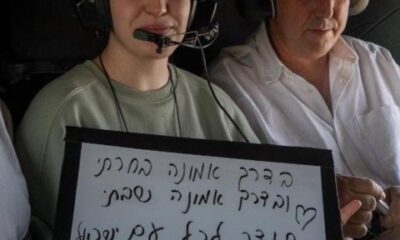
Personal Story

Holidays in ‘What the hell!’ – my volunteering experience
It felt strange being almost the only tourists in Tzfat in the north of Israel in the middle of June, but I wasn’t expecting to be flagged down by a journalist from Yediot Acharonot looking to interview tourists during the war. “Aren’t you worried about your safety?” he asked. I replied, “You clearly aren’t worried about your safety either. You aren’t wearing a bullet-proof vest!”
Tzfat was full of locals going about their daily lives, minus the throngs of tourists who usually clog up its winding medieval streets seeking the mystical Tzfat experience. Now mostly closed and eerily silent, it still has its mountain light filtered through blue glassed-doors and ornate metal gates, perhaps with extra-fervent longing by shop owners and guides for more tourists. Even the custodians of the famous synagogues were unusually chatty.
It was only two days later, while picking cherries at the evacuated Manara kibbutz in the northern panhandle, that I realised how crazy I might be to self-guide my family around Israel during a war. It seemed like the ideal way to achieve a number of conflicting goals. First, to show my 19-year-old daughter the sites in the north not covered by her Taglit Birthright trip. Second, to volunteer without having to do the day-after-day agricultural grind of an organised group from abroad.
Finding places that need volunteers isn’t hard. You join the social media feeds for Swords of Iron Volunteer Opportunities and Leket Yisroel, and they link you to WhatsApp groups for farms short of workers. The group for Kibbutz Manara posted impassioned messages calling for the harvesting of cherries in June before the year’s crop was lost. The instructions said to drive to Ko’ah Junction by 09:00, then call for an escort. Atop a winding road up the Naphtali cliffs were two intersecting high concrete walls guarded by a soldier from the Israel Defense Forces who barely glanced up from his phone. After a while, a battered Subaru swung through the concrete barriers. Out stepped a tiny woman who, except for her wrinkled, tanned face and wiry physique, looked like my sister. She stared at us, and we shared one of those only-in-Israel moments of recognition: maybe we were related?
We followed her to the kibbutz orchards, a scenic mountain road with views over the Huleh Valley, Mt Hermon, and, unmistakably on the left, views of Lebanese villages. I tried not to think: if you can see them, they can see you! The cherry groves were in the shadow of the mountains so were safe from Hezbollah rockets, I reassured myself. The work was shaded and pleasant in an atmosphere of insect-buzzy summer warmth. I was enjoying the rhythmic, bucolic mellowness, when a new thought intruded: drones! Why hadn’t I thought of drones flying over the ridge and finding us here!
More hours passed, and I was ready for my escort to safety down the hill, but our kibbutznik gave us a big container of cherries to take home and a huge thanks and returned to her work. I sped along the potholed road along the Naphtali cliffs trying not to think of drones and we stopped at the Aroma Café at Ko’ah Junction for a well-earned iced coffee. Sitting down, I noticed we were the only non-military people there. The place was full of big men in uniforms, bristling with bulky automatic weapons, yet sipping and chatting like regular joes. During a break in customers, I noticed the barista go outside to give a bowl of water to a stray kitten. It meowed indignantly, hoping for more than just water, but later drank thirstily.
Driving back, my daughter spotted a huge cloud of smoke in the distance. “Is that in the Golan?” she asked. I had hoped to show her my favourite ancient sites and hikes in the Golan, but now I realised, with the Yehudiya nature reserve burning from falling shrapnel, we would need to change our itinerary to sites further south. Back at our hotel, an acrid haze hovered over our lake swim. The hotel itself was mostly occupied by evacuees from Kiryat Shemona, bringing with them their dogs and houseplants, and family squabbles about hanging out too late with friends and finishing homework. In the mornings, they used the breakfast buffet to prepare hasty school lunches, their expressions weary of living like permanent holiday makers.
The next day, Israeli news reported a fire at Kibbutz Manara from falling shrapnel from Hezbollah rockets. I noticed its WhatsApp group was no longer calling for volunteers but now advertising that its orchards were open for people to come pick for free. So much work preparing the harvest and now just giving it away! Still, a kibbutz even further north, named Nimrod peaches, continued to beg for volunteers.
Returning to the middle of the country, life was oddly “normal”. Lots of people shopping, going to restaurants, and even small crowds at museums. Many visitors from overseas looking for ways to volunteer but not sure how. On a bus ride to a food-preparation gig with J17 to support vegan soldiers, I met a French woman heading to a museum. “I’ve been trying to volunteer, but I don’t know where to look,” she said. This seemed to be a common problem among visitors – how to find places that can accommodate people who can’t stand for hours in the hot sun.
But there are plenty of indoor volunteer opportunities. Eran’s Angels, which packs goods for evacuated families, operates from an enormous space below the Tel Aviv Expo and welcomes drop-in volunteers. Similarly, Israel Support Bridge organises donations from abroad in its cool Petach Tikvah warehouse. The Swords of Iron Volunteer Opportunities group posts indoor opportunities every week, including meal preparation for soldiers, visiting soldiers in hospitals, attending funerals, and so on.
And don’t underestimate how spending time with family and friends in Israel is a boon to their spirits. My super-secular relatives, who complain endlessly about Israel turning into a theocracy and the power-hungry, crooked Bibi, were pleased by our visit. They reminded me of that kitten complaining mightily but still lapping up soul-nourishing support from family abroad.
Be wary of “barbecue with soldiers” opportunities asking for large upfront donations that are quasi-businesses. These barbecues are popular with volunteers, and great for “Insta”-bragging. I helped at one near Re’im in the Negev, organised by a synagogue in Tel Aviv – no donation required – an eye-opening view into the dusty and grimy reality of soldiers’ life on base. It was the one time I felt uneasy that volunteering was as much for social media bragging as it was for the benefit of the soldiers. Not that they didn’t enjoy the lavish spread, but they were encrusted with sweat and dust, and waited half an hour while we got everything camera-ready.
Volunteering in Israel in this difficult time was meaningful both for my family and for the Israelis we spent time with, and they definitely need visitors to support their ailing tourism industry. But if you can’t go there, standing up for Israel at home and fighting for its legitimacy is the volunteering Israelis most need you to do.
- Emma Gordon-Blass is an ex-South African who lives and writes in North Carolina.










